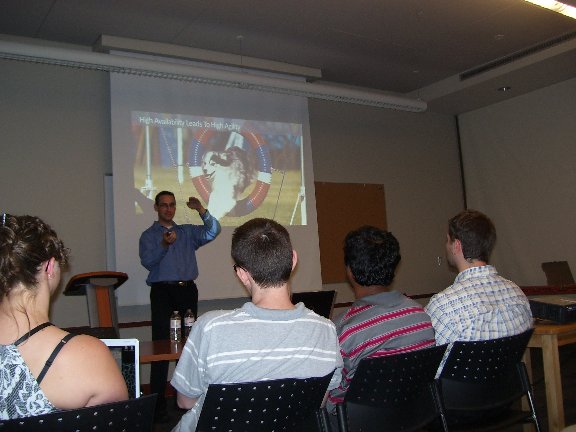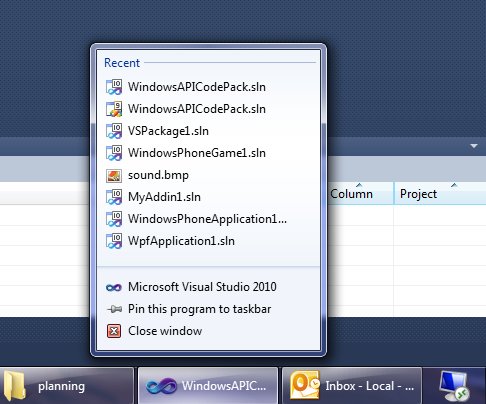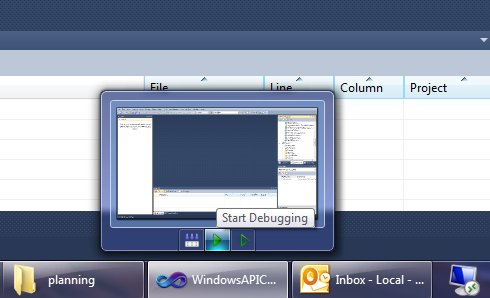 Monday, 23 August 2010
Have you ever heard of the All-in-One Framework? Well I hadn't. They've been around for about 18 months. Back in February, on their first anniversary, they described themselves like this: ...this initiative [has been] developed by the CodeFx Project Group to an "all-in-one code framework" that includes
more than 300 code samples, covers almost all Microsoft development
technologies, ranks 18th among 13000 open source projects on CodePlex,
received numerous kudos from customers, proved its values in real support
incidents, and created a lot of win-win opportunities within the corporation.
It looks like the participants are all Microsoft employees and they're collecting pieces of code for any language and platform that can be used to solve real world problems. On the CodePlex site, they elaborate: Microsoft All-In-One
Code Framework delineates the
framework and skeleton of Microsoft development techniques through typical
sample codes in three popular programming languages (Visual C#, VB.NET, Visual
C++). Each sample is elaborately selected, composed, and documented to
demonstrate one frequently-asked, tested or used coding scenario based on our
support experience in MSDN newsgroups and forums. If you are a software developer, you can
fill the skeleton with blood, muscle and soul. If you are a software tester or a
support engineer like us, you may extend the sample codes a little to fit your
specific test scenario or refer your customer to this project if the customer's
question coincides with what we collected.
For example, they've written a summary of the ways to call native C++ code from managed code. You can find the pieces elsewhere, but having them all together makes it easier for you to compare and contrast. They often blog additions as they are completed.
Now as you can imagine, a big team creating hundreds of samples needs some sort of vision and structure to keep things consistent. That's where the style guide comes in. And now you can download it from CodePlex. It's an 87 page Word document that covers everything you might wonder about, for both native and managed code, including tabs-vs-spaces (no tabs, please), how much to comment (as I blogged recently and not so recently), Hungarian Notation (use it in native code if you must, but it's a relic; do not use it in managed code), smart pointers (yes, but don't bring in all of ATL for them - I look forward to this section being updated for C++0x), the right way to implement IDisposable, and an especially nice section on Interop at the end. I don't care what language you work in - this is a document you should at least skim. It could settle some arguments at the office, improve your code, and spare you from some horrible bugs. Download it, won't you? Kate
 Saturday, 21 August 2010
Recently, I was shown this quote. The person who showed it (in a general talk, not to me personally and specifically) is a smart person I respect, so I'm going to leave that person un-named. The authors of the quote, Kernighan and Plauger, are legends of the field. In 1979 (the very same year I was first paid to program) they wrote:
1. If a program is incorrect, it matters little what the documentation says.
2. If documentation does not agree with the code, it is not worth much.
3. Consequently, code must largely document itself. If it cannot, rewrite the code rather than increase the supplementary documentation. Good code needs fewer comments than bad code does.
4. Comments should provide additional information that is not readily obtainable from the code itself. They should never parrot the code.
5. Mnemonic variable names and labels, and a layout that emphasizes logical structure, help make a program self-documenting.
In general, I agree with this. Point 5 is really strong. But when I watched that person I respect walk through this quote I suddenly realized, for the first time in all the times I've seen this, that 1 and 2 are wrong. Really. They're wrong. Imagine you came across this in a code review: // Process the first 5 elements
for(i = 0; i <= 5; i++)
{
ProcessElement(i);
} I hope it's clear that this code actually processes 6 elements. The program is almost certainly incorrect. Perhaps the reason we're reviewing this part of the code is that there is some sort of message in the event log or unprocessed records or incorrect answers that have led us here, suspecting and hoping to find some incorrect code. And look! A comment that disagrees with the code! It's like a giant arrow pointing to the incorrect code. The documentation doesn't agree with the code, and that's great! It makes it really likely that we've found the bug. This sort of thing happens all the time - developers write the correct logic, as agreed in the requirements, into a comment, but sometimes make mechanical errors in representing that logic in code. If a program is incorrect, comments that represent what the developer hoped or planned or tried to write may be of great value in rendering the program correct (fixing the bug.) If the documentation doesn't agree with the code, with any luck at least one of them is correct. I still actually agree with the conclusions of the quote, and of those who quote it. Good variable names and function names, well structured code, and written requirements are all more helpful than comments inside the code, as I've written before. A true conclusion can follow from a false premise. Still, I was initially shocked to find myself disagreeing with these premises, and I wanted to share that insight. And don't feel bad if you leave "translating into English" comments around from time to time. They may surprise you some day. Kate
 Thursday, 19 August 2010
Telerik is having an Eastern Canada User Group Tour this fall. Evan Hutnick will visit 6 user groups to speak on Silverlight topics. Here are the details for the East of Toronto event: Monday, September 13, 2010 Silverlight
Development Best Practices Speaker: Evan
Hutnick Location: Whitby Public Library - Room 1B
405 Dundas Street West, Whitby, ON, L1N 6A1 In this session, we will
explore best practices of development with Silverlight. This will include a
look at the current toolset (VS2010/Blend) as well as the different options for
architecture and data access (to MVVM or not to MVVM, WCF RIA Services or not,
etc.), as well as how you can structure your application for intelligent reuse
of styles and resources, making it easier to design a large-scale application
with a unified look and feel.
Agenda
| Time |
Title |
| 6:30 - 7:00 |
Socialize and refreshments |
| 7:00 - 9:00 |
Presentation |
See you there!
Kate
 Tuesday, 17 August 2010
This is a story you might find hard to believe. A guy's project is cancelled and he's laid off, but he just shows up to his building (without being paid) and keeps working on it. He gets other people to help him and the product actually ships! One of my favourite quotes: "The secret to programming is not intelligence, though of course that helps. It is not hard work or experience, though they help, too. The secret to programming is having smart friends."
Could this happen today? Almost certainly not. It probably couldn't even happen in another company. Remember the start of all this wasn't the support from former coworkers - that only happened once the product was almost done and the glamour of working unpaid on a feature caught on. The start of this was that a laid-off guy's badge still worked, and then when it finally stopped working he was able to tailgate through the doors every morning. Which leads to my second favourite quote: "We wanted to release a Windows version as part of Windows 98, but sadly, Microsoft has effective building security."
A fun read and a reminder of how some people felt (and still feel) about creating software. Kate
 Sunday, 15 August 2010
I'm collecting link on Windows Phone 7 topics and now is as good a time as any to blog some of them: Plenty of material no matter how you prefer to learn. Why not get started? Kate
 Friday, 13 August 2010
I'm curious about Windows Phone 7, and I've been playing around a bit with the development tools. So when I read that Joey deVilla was holding another of his semi-regular Coffee and Code sessions in downtown Toronto, and bringing his phone, I made the last minute decision to pop down there and join them. I'm really glad I did. A steady stream of people stopped by, mostly just to look at the phone, but a few to deploy their code onto it and see it in live action. There were technical conversations, and some less technical, and a general good time. Joey's blogged about it (with pictures) and is looking for folks who think these would be fun where they live. Let him know if you would participate. Kate
 Wednesday, 11 August 2010
On August 10th, Udi Dahan came from Haifa, Israel, to Whitby, Ontario, to speak at the East of Toronto .NET Users Group meeting. (Well, OK, he was in Toronto to teach a course.) He was talking about high availability and some architectures that let you keep a system up, for example, even while you're upgrading it. I took a few pictures: 

Udi did a great job demonstrating that design up front and thinking about architecture doesn't mean you're not agile. Taking the time to architect something so that it's highly available gives you the freedom to be agile.
Watch for the fall schedule of the East of Toronto group in the next few weeks. And if you're visiting the area and would like to speak, let me know! Kate
 Monday, 09 August 2010
Visual Studio 2010 has pretty cool Windows 7 integration. It gets jumplists right, for example: 
But it could do more, and this little add-in adds some fun extras. Here's a taskbar progress bar overlay during a build: 
(If your build results in errors or warnings, you'll also get a taskbar icon overlay when it's done letting you know about them.) And here we have handy thumbnail buttons - for build, debug, and start without debugging: 
Give it a whirl! You can download it from the gallery, or use Tools, Extension Manager, Online Gallery right in Visual Studio and search for Taskbar.
Kate
© Copyright 2025 Kate Gregory
Theme design by Bryan Bell
newtelligence dasBlog 2.3.9074.18820   | Page rendered at Monday, 22 December 2025 21:02:18 (Eastern Standard Time, UTC-05:00)
|
On this page....
Pluralsight Free Trial
Search
Navigation
Categories
Blogroll
Sign In
|